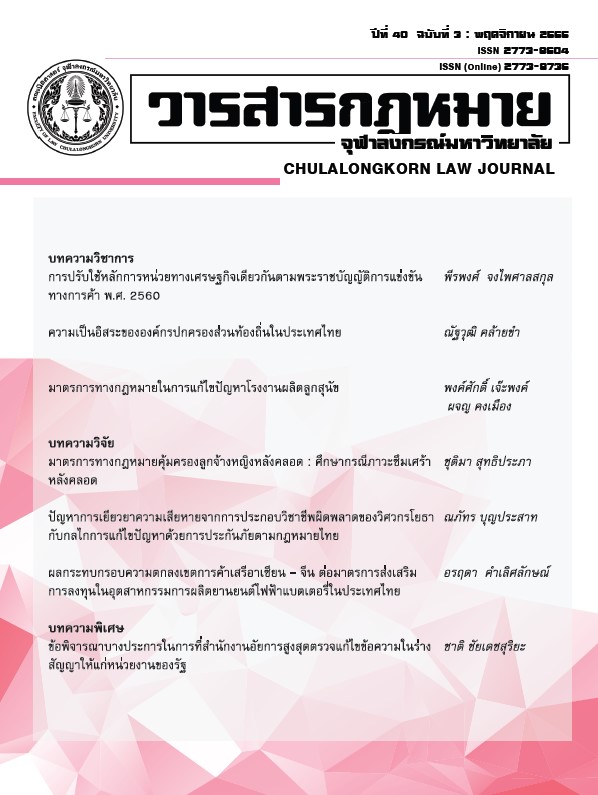The Impact of the ASEAN - China Free Trade Agreement on Investment Promotion Measures of the Battery Electric Vehicles Manufacturing Industry in Thailand
Main Article Content
Abstract
Under the framework of the Free Trade Area (FTA), an exemption from import customs duties is mainly used to eliminate the tariff barrier between the parties under the free - trade agreement which will be helpful for reducing cost of domestic production. However, such exemption from import customs duties can also be an obstacle to the development of domestic industries as it also emasculates the investment promotion measures for specific manufacturing industries of the country. As a result of the negotiation of the ASEAN–China Free Trade Area (ACFTA), an exemption from import customs duties will also be applied to Completely Built Unit (CBU) Battery Electric Vehicles (BEV) imported from China, HS code 8703.80, by Thailand, Cambodia, and Singapore. This article will elaborate on the impact of the exemptions from import customs duties in such cases, which contradicts the idea of investment protection and promotion for manufacturing industry of battery electric vehicles manufacturing industry in Thailand. Consequently, it will cause an adverse impact on the effectiveness of the government’s measures for investment promotion of this very industry in Thailand, the transfer of BEV technology and innovation, as well as an investment diversion from Thailand to other countries. This article proposes to the Thai government that, in order to withdraw from “The exemption from import customs duties”, concession it should seek to negotiate with the Chinese government for such purpose. In parallel to the negotiate, it should apply the government’s policy encouraging the domestic investors to improve their BEV businesses’ competitiveness.
Article Details

This work is licensed under a Creative Commons Attribution-NonCommercial-NoDerivatives 4.0 International License.
The copyright in this website and the material on this website (including without limitation the text, computer code, artwork, photographs, images, music, audio material, video material and audio-visual material on this website) is owned by Chulalongkorn University Law Journal and its licensors.
1. Chulalongkorn University Law Journal grants to you a worldwide non-exclusive royalty-free revocable license to:
- view this website and the material on this website on a computer or mobile device via a web browser;
- copy and store this website and the material on this website in your web browser cache memory; and
- print pages from this website for your use.
- All articles published by Chulalongkorn University Law Journal are licensed under the Creative Commons Attribution 4.0 International License. This permits anyone to copy, redistribute, remix, transmit and adapt the work provided the original work and source is appropriately cited.
2. Chulalongkorn University Law Journal does not grant you any other rights in relation to this website or the material on this website. In other words, all other rights are reserved. For the avoidance of doubt, you must not adapt, edit, change, transform, publish, republish, distribute, redistribute, broadcast, rebroadcast or show or play in public this website or the material on this website (in any form or media) without appropriately and conspicuously citing the original work and source or Chulalongkorn University Law Journal prior written permission.
3. You may request permission to use the copyright materials on this website by writing to journal@law.chula.ac.th.
4. Chulalongkorn University Law Journal takes the protection of its copyright very seriously. If Chulalongkorn University Law Journal discovers that you have used its copyright materials in contravention of the license above, Chulalongkorn University Law Journal may bring legal proceedings against you seeking monetary damages and an injunction to stop you using those materials. You could also be ordered to pay legal costs.
If you become aware of any use of Chulalongkorn University Law Journal's copyright materials that contravenes or may contravene the license above or any material on the website that you believe infringes your or any other person's copyright, please report this by email to journal@law.chula.ac.th.


